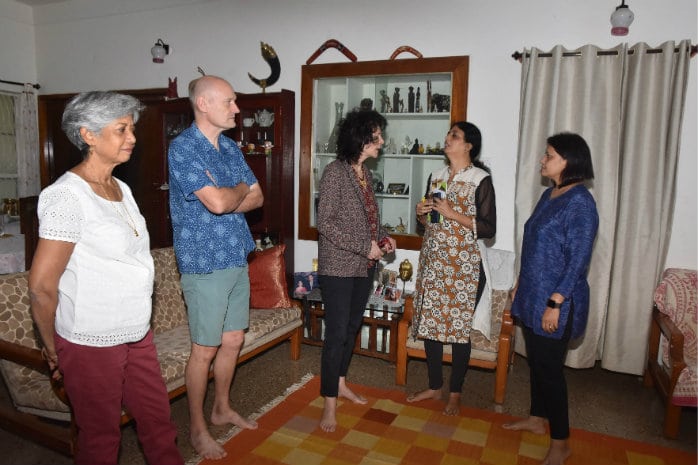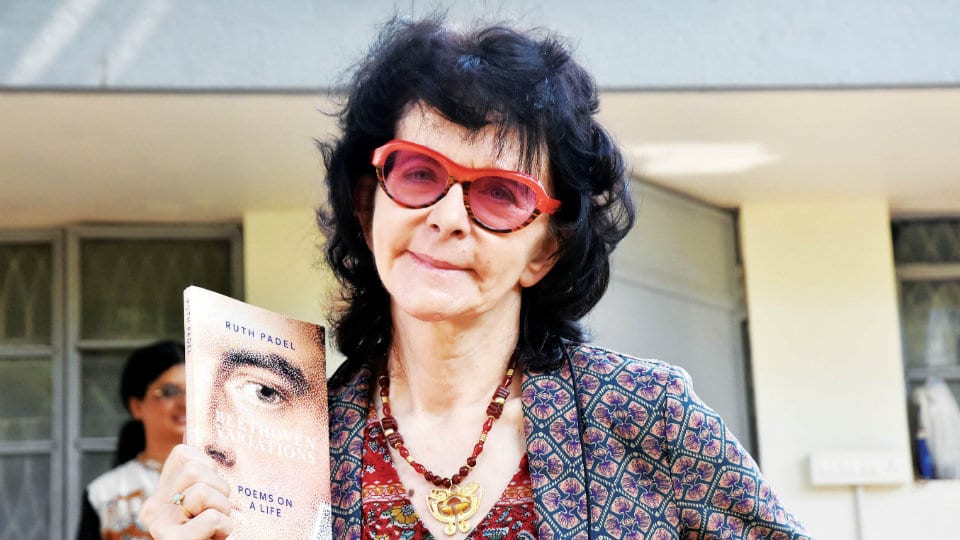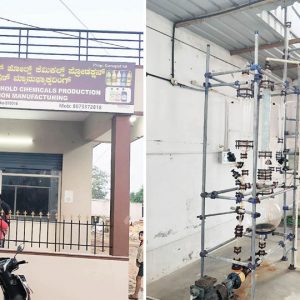Ruth Padel, author and great-great-grand daughter of Charles Darwin in city
A descendent of Charles Darwin, Ruth Sophia Padel is a British poet, novelist and non-fiction author, whose works have been highly acclaimed. She believes poetry connects with every area of life and her poems explore love, music, nature and socially engaging themes like immigration, homelessness and wildlife conservation. Engaged in relating poetry and science, her book on cell migration is said to connect micro-level cell migration to macro-level social migration. With her interest in combining poetry, science and religion, she lectures at the Royal College of Surgeons, London. Her poems on Charles Darwin (2009) was hailed by the literary world as “new species” of biography in verse. Presently a Professor of Poetry at the Kings College, London, Ruth Padel, the great-great-grand-daughter of Darwin, was in city last week talking about her books and also releasing her collection of poems on Beethoven, ‘Beethoven Variations’ at an event under the aegis of Mysuru Book Clubs-2015. Star of Mysore caught up with her where she talks about Darwin (an English naturalist, geologist and biologist, best known for his contributions to the science of evolution), his influence, the need to live and let live. Excerpts.—Ed
By Nandini Srinivasan
SOM: You were the first woman in the all-male Oxford College. I read that they even changed the statutes for you?
Ruth Padel: Ha! It was a little funny. There was a little ceremony and I was welcomed with a glass of wine! But yes, it was an all-male bastion. The tradition of the Oxford Colleges go all the way back to the 14th century. All students at Oxford and every other medieval University, were men. The men there weren’t supposed to marry and it was only in the middle of the 19th century were they allowed to marry. But even so they were all men and it was only in the 1960s and 70s that things started changing. I went to a female college. By the 1960s there were 5 female colleges and 21 male colleges. When I was doing my Ph.D, I became a Research Fellow in Wadham College, Oxford, so they had to change the statutes to allow me.
SOM: You are called as the sexist voice of Britain.
Ruth Padel: Oh that was then! I am sure there are far more sexist voices now. Well, yes maybe it was because of the language of my love poems…the poems about the way men looked at women. That was why maybe I was called sexist.
SOM: You’ve even argued that rock music began as a wishing well of masculinity.
Ruth Padel: Yes, rock music when it began was very masculine. Written, composed, sung by men. The Rolling Stones, for example, were very masculinist in a way. There were very few female voices like Janis Joplin. It was only in the late 70s and 80s that women singers developed their own sophomore music.
SOM: In your study I’m a Man: Sex, Gods and Rock ‘n’ Roll, you drew on mythical connections between male sexuality, aggression, anxiety, misogyny and violence which derived from ancient Greece.
Ruth Padel: Yes. I was interested in the way Greek mythical thinking dominated the West. The myths were very much infused into rock music.
SOM: But why violence in particular?
Ruth Padel: Violence is everywhere in Greek mythology. Mainly because it deals with the family. For instance, ‘Orpheus’ the great singer, he went down to find his wife in the underworld and he didn’t get her back. So he went around singing and the women, who followed ‘Dionysus’, the Goddess of wine, tore him to pieces!! They threw his head in the river. His severed head kept on singing till it reached the sea! So much violence and more and the West was definitely influenced.

SOM: You also teach Greek?
Ruth Padel: Yes, I love the language, the culture, ancient stories and poetry.
SOM: What similarities do you see between Greek and Indian mythology?
Ruth Padel: I am very interested in that. I was working in Greek tragedy which is theatre. I got very interested in the parallels between Koodiyattam (performing art form of Kerala) and Greek tragedy. And when I met late Girish Karnad in London, he gave me a lot of his plays which were very interesting, particularly the one about King Cobra, Nagamandala. In fact a good friend of mine, Arshia Sattar, a renowned author and translator who lives in Bengaluru, is also an expert in Sanskrit. I would like to do some work with her. One of the things I am thinking about is Prometheus, in Greek mythology, who defied the Gods by stealing the fire and giving it to humanity as civilisation. Arshia has been sending me a lot of Hindu myths about fire. Fire stands for civilisation but is also very destructive. It’s not so much about relationships of influence, but there are parallels between how ancient cultures explained things and how myths grew up around them. In fact the first scholarly book I wrote, In and Out of the Mind, is about how Gods are inside and outside of us. From the beginning I compared the experience of being in Hinduism and the lost world of ancient Greeks.
SOM: You have 12 collections of poems. The latest, Beethoven Variations was released in city last week. You’ve written about music, nature, history, homelessness, immigration, wildlife. You relate poetry and science, writing verses on cell migration, genetics and zoology.
Ruth Padel: I write about the things I am. I don’t write about mathematics, I haven’t yet! Because of the Darwin factor and biology that came from my family (my mother’s mother was Darwin’s grand-daughter), the family tradition of looking at things in a scientific way, of respecting Science is innate. That’s why I’m so mad at people who deny things like climate change! It’s just not respecting Science.
SOM: How palatable are your poems when it is about snakes and cells?
Ruth Padel: Well, I play with the words. Like when I write about snakes I use special words like ‘every snake cocktail is a unique mixture of polypeptides enzymes and glyco proteins’, these are interesting words, so why not put them in. And genetics, DNA is so interesting. You have two strands in a DNA molecule. But they go different ways. One goes down and the other goes up like that. So when the DNA replicates, the strand that goes down it is easier for it to replicate. The other one has to come out in a complicated way. And that’s so interesting and makes me think of the internal contradictions in ourselves. We are all a mix of conflicting motives, impulses.
SOM: So the helix makes you connect anything to anything?
Ruth Padel: Yes but you have to think about it in a scientific way. For instance I have written a book which is coming out in summer. It is called ‘The Mara Crossing.’ That is about migration, from cells to souls. Cells migrate in our body for two reasons. They migrate when a woman is pregnant to form the foetus and they migrate when we have an infection, to defend us from the infecting bodies. So there are two reasons for migration. To create new life or defend the organism. So migrants coming into a culture create it or defend it and make it healthy. America was formed by migrants. In fact, Donald Trump’s grandfather was an illiterate 16-year-old labourer from a part of Bavaria where there was drought five straight years.
SOM: You are known for your explorations through poetry of migrations and refugees and homelessness. And you believe that poetry has a responsibility to look at the world. In this connection how do you see the issues of citizenship that’s raging India?
Ruth Padel: I think it’s wonderful there are so many protests. But honestly I don’t know too much about Indian politics, but there are similar things happening all around the world. Of protesting against the other, the other within. And for us in Britain the self destructing act of leaving the European Union. The false populism being whipped up against immigrants. And I must say as an ex-colonising power, we have done more than our share in creating conditions in which the refugees have to flee. We support all sorts of mining in South Africa, which makes surrounding landscapes uninhabitable. So people have to leave.
SOM: But everywhere the immigrants move in, it makes people of that land afraid of losing their own identity?
Ruth Padel: Yes! it’s true. But the world is changing. We are changing the world. We have responsibility human beings. The United Nations, last week, has passed a law making it illegal for any country to refuse climate migrants. Now what is going to happen, we don’t know. It’s not about ‘my country’ and ‘your country’, it is more about ‘our world.’
SOM: I read somewhere that more than sex drive, the need to stay put in one’s roots is much more in a human being?
Ruth Padel: That is very interesting as human civilisation spread by people not staying in their roots. When you think of the huge Indian diaspora all over the world and particularly in America, when you think of the trade that’s going on across the Indian Ocean to South East Asia, I think a lot of the nationalism now that is in every country is about fear.
SOM: How much has Darwin influenced your writings? Your book Darwin: A Life in Poems, is a moving interpretation of life and works of Darwin.
Ruth Padel: Yes, the poems there talk about a lot of things, portray the life of scientist, the private man and a tender father. It also talks how deeply Darwin and his wife Emma loved each other, but both were aware of the gulf between them because of her deep Christian faith and his increasing religious doubts. For Darwin, death and extinction were nature’s way of developing new species: ‘the survival of the fittest’; for Emma, death was a prelude to the afterlife. And yes, definitely my family tree has helped my scientific way of looking at things.
SOM: It amazes me that DNA interests you as much as the severed head singing along the river in Greek mythology.
Ruth Padel: Yes! The Latin Scientia, from where we get the word Science, means to know, so scientia meant knowledge. It didn’t mean science. Real knowledge, as Plato says, is based on facts, not on opinion. Opinion is one thing but true knowledge is something else.
SOM: The book Where the Serpent Lives is on crime in wildlife. In Karnataka as well?
RP: Oh it’s happening everywhere. Tiger poaching, elephant poaching and even deer poaching. Tigers eat deer. So if you eat them, then may be tigers will have to eat something else like a cow. But villagers will not let that happen; so they then poison the tiger, it’s a vicious circle.
SOM: You say cell or souls, relationships matter?
Ruth Padel: Absolutely. Relationships is everything. The way animals relate to each other is fantastic. In the tigers, the big bond is between mother and cubs. When you see a pack of tigers, it would generally be the mother and her cubs, not mates actually. In my book I have said tigers are too heavily armed to mate often! They are giants with large teeth and claws. They have a social system and mark their territory by spraying or with their claw marks on trees. So if you have a male tiger who wants to go out in the night he will check these marks. If it’s faded it means tigers there have moved out and it’s safe for him to go there now. Otherwise they keep out. Or the smell of the spray might also tell him that this tiger is old and weak and maybe I can take over. Elephants have a different kind of relationship. They are like us, they invest a lot of time in parental care. They mourn the death and also exhibit a lot of gratitude. My next book is on elephants. Development is a very heavily loaded word. In the name of development, we don’t have to compromise on vital issues like environment conservation. We need them all to live and maintain an ecological balance, just like the world needs everyone.
SOM: So coming back to the survival of the fittest, who will survive in the world now?
Ruth Padel: As of now, the unscrupulous seem to be more fit to survive. But in the long run, popular opinion will succeed, helping us move away from the unfair men! Development will be there in terms of materialism but there is a need for moral development to protect the weak.








Congrats to Nandini Srinivas for an inspiring, informative and educative interview with a scientist poetess and to SOM for publishing the article. The title is “There Is Need For Moral Development To Protect The Weak” is very apt when survival of the fittest concept of Darwin is discussed towards the end of the interview. If we look today in current India who are surviving in economic and political arena? The fittest are those who can break rules of law and bribe any one and every one. Look around Mysuru, who have the maximum land holdings? Who have been able to control expensive real estates? Just one small and trivial example. In whose memory are our streets named? It is difficult to find a street named for a social activist. Most are named after politicians for their “noble’ contribution. This again proves Darwin’s theory that even after death it is only the “fittest whose memory survives’. Mysore was lucky in having a wll accomplished scientist like Dr. H A B Parpia who was a great social activist who fought till the last date to promote among other things quality education. Is there any interest to name a street in his memory which can inspire professionals to get involved in social work?